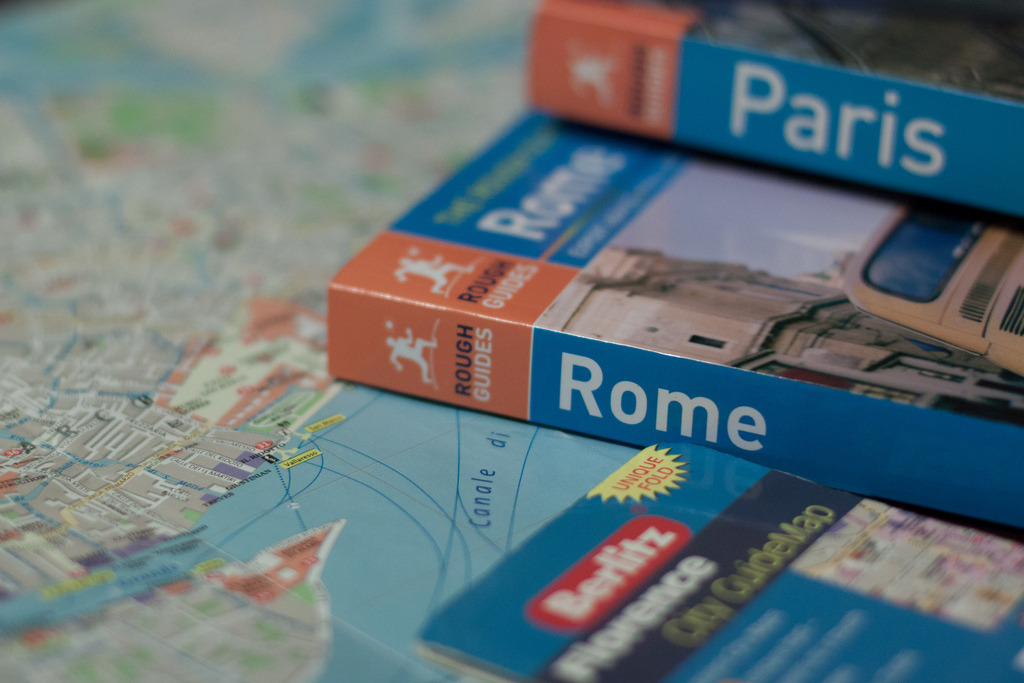Glancing along a bookshelf at home, names of countries and cities jump out from the spines of various travel guides. Rome, London, and Japan neatly wrapped and bound in a small volume. But rather than prioritising information, or constraining a sense of a place, a good travel guide, in the view of Rough Guides’ Senior Editor Neil McQuillian, “is distilled by author and editor from reams of research, both online, and most importantly, on the ground.”
The very title of Rough Guides’ compendium for first-time travellers, Rough Guide to First-Time Around The World, admits both the hugeness of the world and the exciting possibility of its navigation. By distilling information and experience, in “seeking to get to grips with a place,” good travel writing perhaps combines a tangible expression of that place’s atmosphere whilst allowing every experience to be personal, spontaneous, and new.
As McQuillian explains, during his research for articles, “I focus on in-the-moment observations and, crucially, interactions with people. You can write some of what will prove to be your article’s best bits right there and then.” Although Google news alerts and Twitter searches are an important kickstarter, the “cardinal travel writing sin is attempting to define a place without engaging the people who live there.”
More impersonal or objective tips are an important part of travel guides, but what really prepares a reader for the place then is this sense of personal experience and its interpretation. McQuillian suggests that “it’s all about imagination to the extent that you’re telling a tale. Hold your ‘real’ experiences lightly in your mind and let imagination do its work, pulling those experiences into a form that others will respond to.” The philosophy of travel publishers like Rough Guides is this: to write adventure, but never fiction, constantly aware that a well-written adventure can let readers’ minds wander anyway.
Indeed, travel writing is a form that has a long and rich history, perhaps peaking in what McQuillian describes as a “travel writing golden age” the 1970s and 1980s, with writers like Paul Theroux and Bruce Chatwin. But more traditional printed forms have suffered a decline since then. The primacy of “on the ground” research remains vital, but just as online research acts as another well of knowledge for printed guides, the internet represents in itself a major medium for travel writing. It is diverse—www.roughguides.com alone contains about ten articles on solo travel, including particularly insightful approaches such as ‘Go it alone: a guide to solo travel for introverts.’ The prolific rise of travel blogs and Instagram accounts also reflect how travel writing has become more democratic and accessible.
Might we see the role of the internet enabling a new kind of golden age? It some ways it would seem not—McQuillian notes how readers are tiring of unreliable reports and biased reviews that may help to explain a recent rise in the sale of printed guides after a diffi cult decade. Interestingly, he points out that print travel sections tend to be longer than online articles, often based on the assumption that online audiences have a shorter concentration span (take the example, ‘17 places to take your pug in Peru’). And while the internet does still off er a wealth of concise, useful articles and snapshots of themes and places, a reviving trend of longform journalism also encompasses quality travel writing, again returning to the narratives of travel, of storytelling and immediate detail.
McQuillian suggests that the decline of more traditional travel writing like that characterised by Theroux and Chatwin can be attributed to a sense of the world getting smaller, travel getting easier. As he reminds us however, “that hasn’t stopped small-mindedness—it hardly needs saying that now there is an urgent need for cultural understanding.” Where cultural relations become defined by statistics and stereotypes, informed and nuanced travel writing can play a unique role in fostering that understanding.
Classic travel ideas still take a hold on people’s imagination—The Rough Guide to Europe on a Budget is available from the 1 March (£17.99) in its fifth edition, for example. At the same time, both in print and online, countless niche approaches to travel are catered for. But as a genre that depends on a sense of freedom and particularity for its raw materials, there is no need to favour one way of seeing—McQuillian suggests that during writing, “your subconscious will see to the thematic choreography.” Travel writing may have evolved, but celebrating cultural engagement in a multitude of ways remains as important a message as ever.



